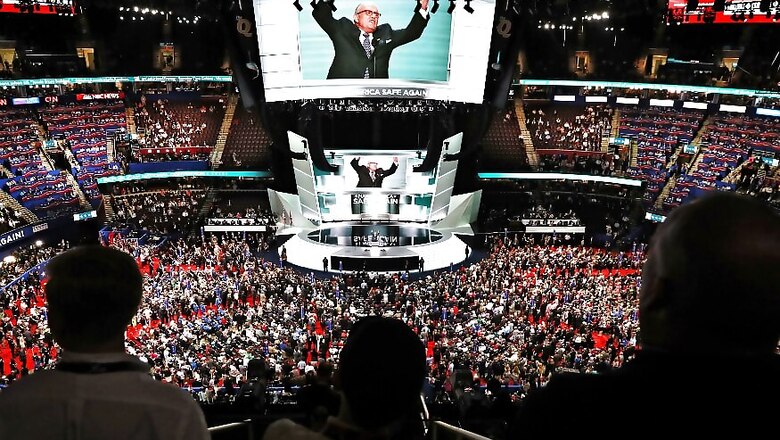
views
Not so long ago, it seemed to Rudy Giuliani that he would be presiding over a hefty part of the world.
Holding court a few nights after the 2016 election in a private cigar bar on Fifth Avenue, glass of Macallan at hand, Giuliani boasted to friends that President-elect Donald Trump would soon nominate him to the most prestigious of Cabinet posts.
“How about,” Giuliani asked, “secretary of state?”
Chief global representative of the US in war, peace and trade.
It would be a sublime reward for having thrown in with Trump when the respectable Republican establishment was keeping its distance, a fresh burst of stardom in a public life that had been fading fast.
Three years on, Giuliani never got the job he believed he had coming — “a bitter disappointment,” his now-estranged wife says — but in his five decades as a public figure, he has never been more prominent in national affairs.
Step by step, he has escorted Trump to the brink of impeachment. Giuliani himself is now under criminal investigation by federal prosecutors in the very office where he enjoyed his first extended draughts of fame nearly four decades ago. The separate troubles he has gotten his client and himself into are products of the uniquely powerful position he has fashioned, a hybrid of unpaid personal counsel to the president and for-profit peddler of access and advice.
Practically no name, other than Trump’s, was mentioned more than Giuliani’s at the impeachment hearings and in a subsequent Democratic report that described him as the hub of a grievous abuse of presidential power (or legitimate advocate for Trump, in the Republicans’ minority response).
A dozen witnesses testified over five days and if Giuliani were somehow subtracted from their stories, there seems to be no one in or out of government who could take his place as the president’s man on the ground. No one to carry out a campaign to force a vulnerable ally, Ukraine, to damage a political opponent of Trump and undermine a special counsel investigation in ways that would help both Trump and an ally now in prison for laundering millions of dollars.
Each modern impeachment saga — of Richard M. Nixon, Bill Clinton and now Trump — has been shaped not by grievances over policy differences but by human vanities and appetites. In this case, those include Giuliani’s, which have run in strong currents for decades, unconcealed.
The forces that have returned Giuliani to the stage at age 75 are the same ones that made him a star federal prosecutor as a young man, a memorable mayor of New York in the 1990s and a scorched-earth advocate for Trump in 2016: his relentless drive to put himself at the center of public life and his very high regard for his own virtuousness.
Patrick Oxford, a former law partner and chairman of Giuliani’s 2008 presidential campaign, who praises him as “a fine man,” says he has not changed.
“He’s just a whole lot more of what he was,” Oxford said. “I’ve noticed that political figures have a hard time retiring from the scene. I think my friend Rudy may be trying too hard to remain involved.”
His personal life has descended into the sort of well-appointed shambles that material wealth can disguise, though not necessarily make any less fraught.
A third marriage has fallen into divorce court ruins, revealing monthly expenses of $230,000 for six homes and 11 country club memberships. By taking Trump as a client, he lost a position at a law firm in 2018 that paid him $6 million annually, according to court filings. In October, he broke with a partner in a security consultancy, a former police officer who had been at his side for three decades.
“He doesn’t just like the spotlight,” his estranged wife, Judith Giuliani, said in an interview. “He craves it, for validation.”
She said she could scarcely believe he was working for Trump, given his disdain for people like Clinton, whom he saw as dishonest. But public attention, even refracted through Trump, was irresistible, she said.
Perhaps that helps explain the velvet-glove treatment he lavished on two Soviet-born American businessmen.
Giuliani brought one of them, a former penny-stock trader with a string of bad debts, to the state funeral of President George H.W. Bush last December.
And both men were Giuliani’s guests this year at an annual dinner he gives for a band of people, mostly city workers, knitted together after the Sept. 11 attacks.
Other guests were perplexed by the men’s presence.
Had they been at ground zero in 2001?
No, they had not.
They were part not of Giuliani’s past but of his wished-for future.
He deployed both men to find pressure points in Ukraine, and joined them in undermining an American ambassador. His intentions, he says, were pure. “As a person who finds public corruption a cancer,” Giuliani said, “I cannot ignore it.”
Nothing shows how few limits Giuliani observed as plainly as his extended bear-hugs of Lev Parnas or Igor Fruman, his friends, clients and fellow emissaries for the president of the United States — the men he brought to his 9/11 dinner at the Maloney & Porcelli steakhouse in Manhattan.
Giuliani may have been stopped from becoming secretary of state in 2017 by his business entanglements, but as Trump’s personal lawyer in 2019, he created and oversaw the dominant U.S. foreign-policy channel with Ukraine, running the president’s affairs, his clients’ and his own through it.
That brought Parnas and Fruman into the president’s wake, sea gulls following an ocean liner.
When they met Giuliani last year, Parnas, born in Ukraine, and Fruman, a native of Belarus, were on the prowl for influence to help their companies and over time would plow about $700,000 into political campaigns.
Fruman also had a business distributing luxury products in Ukraine, including yachts, jewelry, cars and electronics.
Parnas’ résumé includes work for companies that sold penny stocks in New York, a string of evictions and lawsuits in Florida and a judgment, now approaching $700,000, owed to an investor in a film project. He started a company called Fraud Guarantee to provide due diligence services for investors. Like other business ventures of his, it was a bust. But it managed to pay $500,000 to Giuliani, who served as godfather for Parnas’ newborn son and attended the bris in Boca Raton, Florida.
Giuliani opened doors for them and they reciprocated at an opportune moment.
Late last year, Giuliani began to pursue information in Ukraine that he believed might show that the inquiry by special counsel Robert Mueller was built on a false premise, that it was really Ukrainians who meddled in the election and then framed the Russians for it.
This had long been the claim of Paul Manafort, the former Trump campaign chairman, now serving 7 1/2 years in federal prison for laundering millions of dollars from the Russia-aligned political party in Ukraine.
Manafort maintained that he and Trump were victims of Ukrainian meddling that took two forms: the release of a mysterious slush fund ledger that detailed payments by the Russia-aligned party, including $12.7 million earmarked for Manafort; and the hacking of Democratic National Committee computers that was blamed on Russia.
“The original investigation came to me from an investigator who had a client who said that the Ukrainians were the ones who did the hacking,” Giuliani said in April. In addition, he said, he was told that the release of the ledger was a malignant act by Ukrainian forces hostile to Trump — and that it might be a forgery.
So, he said, he had a duty to Trump to run it down.
Far more than a lawyer serving a client in a legal matter, though, Giuliani continued his Ukraine project long after Trump was clear of any jeopardy from the Mueller investigation, which ended in March.
Pinning the 2016 cyberattacks on Ukraine was a steep hill to climb, as the Senate Intelligence Committee had unequivocally found that they were a Russian operation. Even so, Giuliani demanded that the country’s new president announce an investigation of it, according to Gordon Sondland, the American ambassador to the European Union.
Equally difficult would be showing that Manafort was a victim of a forged paper ledger: Electronic bank records were so overwhelming that he pleaded guilty.
Nevertheless, if blame were seen to have shifted to Ukraine in these episodes, Giuliani would provide balm for Trump’s lingering furies that the findings of Russian involvement had tainted his presidency. Debunking the slush-fund ledger could also help build the case for a pardon of Manafort, Giuliani said.
Enter Parnas and Fruman, guides in Giuliani’s search for vindication of assorted conspiracy theories.
They connected Giuliani to a former prosecutor in Ukraine who added another twist to the plot. He claimed that Vice President Joe Biden had forced his removal because Biden’s son, Hunter Biden, had been given a lucrative, little-show position by an oligarch who wanted the prosecutor out. Proving this would be yet another steep hill to climb, as the prosecutor’s record was so dismal that his dismissal was also sought by the European Union, the International Monetary Fund, the G7 and Ukrainians who protested his actions.
Still, Giuliani’s project expanded from Manafort to include the vilification of Biden and yet one more person: the American ambassador in Kyiv, Marie Yovanovitch.
The ambassador, an advocate for reforms in the Ukrainian energy sector, testified that she believed Parnas and Fruman saw her as an obstacle to their business plans. Parnas assured people — prophetically — that she would be removed in short order.
Giuliani fed claims about the ambassador and Biden to a writer at The Hill, bundled articles and memos into folders from Trump hotels and sent it all to Secretary of State Mike Pompeo in a big White House envelope. Though the charges against the ambassador were decried by the State Department as fabrications, they were amplified on Twitter by Donald Trump Jr. She was abruptly ordered home.
Phone records show that Giuliani was in frequent touch with the White House during this time, including with a regular caller identified only as “-1,” who congressional investigators suspect may be the president.
His project to deliver a crushing blow against a Trump opponent, and to establish that Trump — not the Democrats — had been the victim of foreign interference in the 2016 election, would fade into a toxic fog of impeachment charges.
Giuliani and his two friends got together for lunch on Oct. 9, at the Trump International Hotel in Washington, the company cafeteria of Trump-world, where hamburgers go for $26 and the least expensive shots of Macallan are $29.
All three were heading to Vienna — Parnas and Fruman that very evening, Giuliani the next night.
That evening, as they waited to board their Vienna flight, Parnas and Fruman were arrested on charges of making illegal campaign contributions — in part, prosecutors charge, to influence the removal of the ambassador.
Few people could have been more astonished at Parnas’ access to the halls of power and prestige than those who say they were bilked or stiffed by him. A lawyer, Robert J. Hantman, represents a creditor with a judgment against Parnas.
“It’s unbelievable that these people would be in the White House, or be hanging out with Giuliani,” Hantman said. “For Giuliani, the president, or anyone who wants to work with him to not have googled him, it’s unreal.”
In a world with few boundaries or limits, it was very real.
Jim Dwyer, Jo Becker, Kenneth P. Vogel, Maggie Haberman and Sarah Maslin Nir c.2019 The New York Times Company




















Comments
0 comment